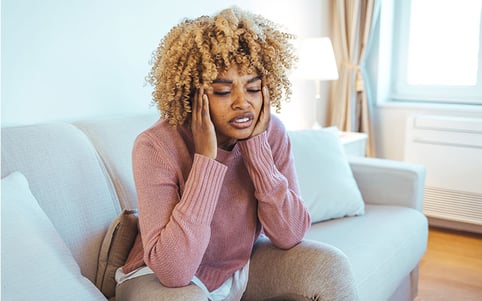Morning sickness
Nausea might be the most well-known pregnancy symptom, and it hits hardest in the first trimester. Despite being commonly referred to as “morning sickness,” nausea can hit at any time of the day or night. It’s commonly caused by a hormone produced by the placenta.
Here are some ways to counteract nausea:
- Keep something in your stomach. Eat crackers, toast, or dry cereal before getting out of bed in the morning or whenever you feel sick.
- Avoid smells that make nausea worse.
- Eat small meals throughout the day.
- Avoid eating greasy, spicy, or fried foods.
- Try ginger tea, chews, or drops.
- If you are vomiting, it’s important that you stay hydrated. Sip clear liquids.
- Try the over-the-counter vitamin B6 or a combination therapy of vitamin B6 and doxylamine (Unisom SleepTabs or generic). Take 10 to 25 mg of vitamin B6 three times a day, every 6 to 8 hours. Add doxylamine 25 mg once before bed if the B6 alone doesn’t alleviate symptoms (Note: over-the-counter medications aren’t eligible for CHM sharing).
- Consider talking to your doctor about medications to treat the symptoms of pregnancy-related nausea.
Back and sciatic pain during pregnancy
Back and sciatic pain during pregnancy is, unfortunately, fairly common. Here are some ways to fight back pain, sciatic pain, and cramping during early pregnancy:
- Use a side-lying position with pillows between the knees, behind the back, and under the abdomen to give you support.
- Rest on a supportive mattress.
- Wear low-heeled or athletic shoes.
- Sit up straight and avoid slouching.
- Change positions often, whether sitting, standing, or lying down.
- Engage in physical activity to build muscle strength.
- Use your legs and squat to pick up objects. Do not bend over.
- Use massage, take a warm shower, or apply ice for 15 minutes at a time (then remove) to help with low back pain.
Avoid over-the-counter medicines until you speak with your provider. If your pain is constant and hasn’t gone away after trying these suggestions, call your provider.

Sore nipples and breast tenderness
Sore nipples and breast tenderness are often an early sign of pregnancy, and symptoms can include tingly, sore, and swollen breasts as well as sensitive nipples. These discomforts are caused by hormonal changes. To help with the discomfort, you should:
- Go up a bra size (or more).
- Wear a bra to bed.
- Wear a support bra that is not too tight.
Pregnancy fatigue
Early pregnancy comes with a lot of hormonal changes accompanied by many physical issues. One of these issues is fatigue, which is caused when progesterone levels spike. To help with fatigue, you should:
- Take more rest periods or naps, if possible.
- Make adequate sleep a top priority.
- Try to get eight hours of sleep each night.
- Try winding down with relaxing activities before bed.




